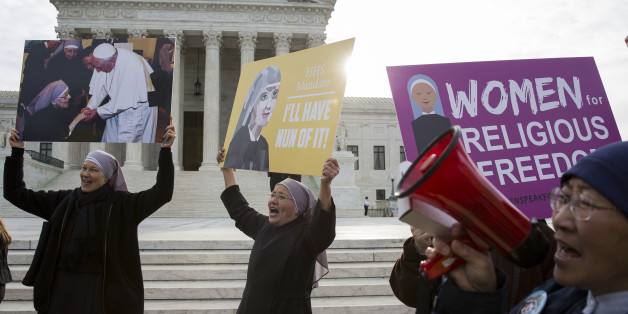
The idiocy that currently pervades this country is faithfully reflected in a case that was argued Wednesday before the short-handed United States Supreme Court. The issue is over whether religiously-affiliated universities, hospitals, charities, and other such organizations should be exempt from Obamacare’s requirement that employees of those groups be covered for contraceptives.
Churches, synagogogues, mosques and other houses of worship are automatically exempt. The Obama administration has tried to make it as easy as possible for another group, religiously-affiliated non-profit organizations, some of which have hundreds of employes, of various faiths or none, to claim exemption also. But some of these groups complain that even the simplest requirement is too much for them.
All it takes for any of these groups to be exempted is that an appropriate representative of the group fills out the answers to three questions on a single page that asks only the organization’s name and address, the name and title of its representative, and the fact that it is a religous non-profit. The operative words of the federal document, EBSA Form 700, read as follows:
I certify that, on account of religious objections, the organization opposes providing coverage for some or all of any contraceptive services that would otherwise be required to be covered.
The form must then be signed, dated, and submitted to the group’s insurance company, which will, itself provide the employee contraceptive coverage, subsidized by the government. The seven groups objecting to doing so include The Little Sisters of the Poor, an eldercare charity run by nuns, the Roman Catholic Archdioceses of Pittsburgh and Washington, a group of priests and several Protestant colleges and universities.
These plaintiffs argue that they should not even have to submit the three-question exemption form that simply says that they object to providing coverage. Simply objecting in writing, they argue, would somehow make them complicit in sin, by making their workers eligible for contraceptive coverage, even though the plaintiff organizations would have no part in that coverage.
Even more absurdly, four of the eight current justices sounded like they agreed with this far-out argument. “They think that complicity is sinful,” sympathized Chief Justice John Roberts, who may have felt that his two votes in favor of Obamacare were quite enough.
As Robert Barnes of the Washington Post pointed out, the case is to be decided under a law called the Religious Freedom Restoration Act.
The RFRA says the government must have a compelling reason for laws and programs that substantially burden religious beliefs and even then government must provide that the law is the least burdensome way of achieving its goal.
Roberts and [Justice Samuel] Alito said women could receive contraception in other ways — by buying insurance elsewhere or even through one of the exchanges under the Affordable Care Act [Obamacare]...
But Verrilli [the government’s attorney] said that would be contrary to Congress’s plan that women receive all preventative care in a seamless fashion from their insurance. Besides, there are no insurance policies just for contraception.
The conservative justice usually most likely to side with the court’s four liberals, Anthony Kennedy, seemed to feel, as did Roberts, that the plaintiffs were correct in alleging that the government was “hijacking” their insurance plans to provide the coverage, even though the plans are not religiously affiliated and the government will subsidize them. But even Kennedy worried that granting the exemptions might be exempting too many people — as in the case of universities which provide insurance coverage to their students, faculty and staff.
The liberal justices worried about that too. Among them, Elena Kagan also pointed out that the groups were “objecting to objecting,” and Steven Breyer said he was having trouble seeing how the complaints were different from those of people who object to paying taxes because the money could be used for war. Justice Sonia Sotomayor asked that if everyone who felt laws that violated their beliefs could exempt themselves, “how will we ever have a government that functions?” How, indeed, will we?
How anyone can argue with a straight face that simply filing a few words of objection to gain exemption from employee contraception violates any group’s freedom of religion beggars the imagination. If, as seems likely from the tenor of today’s questioning, the court is divided four-to-four, the decisions of the lower courts will stand when the Supreme Court decision is announced, probably in June. That is unless the court orders the case to be reargued whenever it is restored to its full nine members.
Eight of the nine federal courts of appeal have ruled against the religiously-affiliated groups, meaning that those in most of the country will have to apply for the exemption to get it and avoid what some have described as “ruinous” fines.
But the Court of Appeals for the 8th Circuit, which covers six midwestern states and Arkansas, has ruled that the groups are protected by the First Amendment’s freedom of religion clause. So plaintiffs in those states cannot be forced to apply or be fined.
Freedom of religion is as fundamental a right as exists in this country. But like all others, it is not unlimited. Freedom is not license. And it should not be in this case.





